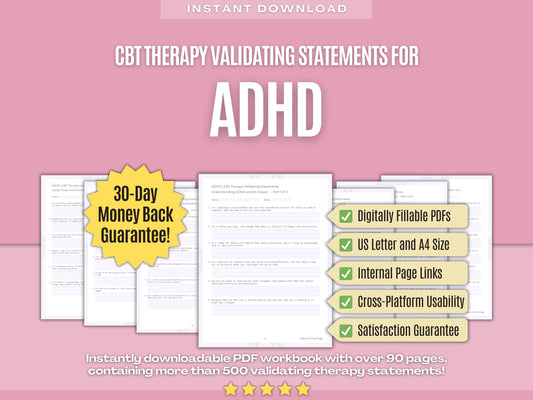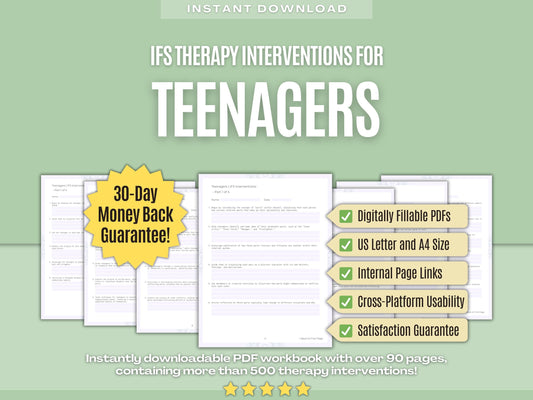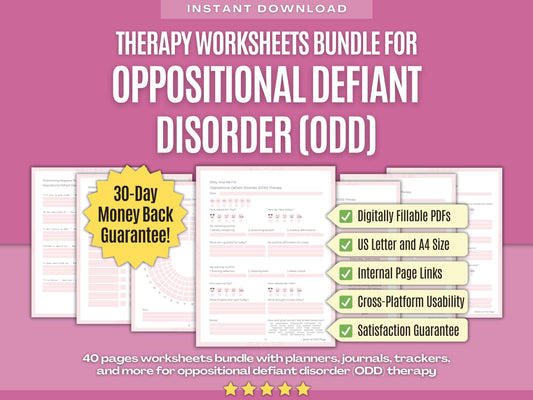Elevate Your Therapy and Guide Your Clients to Inner Healing with Our Stress and Anxiety Coping Skills! ✨
1. Identifying Your Triggers
- Keep a journal to track your thoughts, emotions, and behaviors when you experience stress or anxiety, helping you identify patterns and triggers.
- Reflect on past experiences and situations that have led to feelings of stress or anxiety, identifying common themes or triggers that you can work on addressing.
- Seek support from a therapist or counselor to explore underlying issues contributing to your stress and anxiety, and develop coping strategies tailored to your individual needs.
- Practice assertiveness skills to communicate your needs and boundaries effectively, reducing the likelihood of being exposed to triggering situations or interactions.
- Use imagery techniques to visualize yourself successfully navigating triggering situations, building confidence and resilience in managing stress and anxiety.
- Develop coping strategies, such as distraction techniques or grounding exercises, to manage acute symptoms of stress or anxiety when triggered.
- Identify negative thought patterns or cognitive distortions that contribute to your stress and anxiety, and challenge them with more balanced and realistic perspectives.
- Set boundaries around technology use and social media to reduce exposure to triggering content and promote a healthier balance in your digital consumption.
- Practice mindfulness-based stress reduction techniques, such as meditation or yoga, to cultivate a greater sense of calm and resilience in the face of triggering situations.
- Seek social support from friends, family, or support groups who can offer understanding, validation, and encouragement as you work on identifying and addressing your triggers.
- Consider seeking professional guidance from a therapist or counselor trained in stress and anxiety management, who can provide personalized support and guidance in identifying and addressing triggers.
Need more? Find all 500+ Coping Skills for Stress and Anxiety Therapy in our Digital Workbook!
2. Practicing Mindfulness
- Begin each day with a mindfulness meditation session, focusing on your breath and bodily sensations to cultivate a grounded and present state of mind.
- Engage in body scan meditations to bring awareness to each part of your body, releasing tension and promoting relaxation from head to toe.
- Practice gratitude by reflecting on the things you are thankful for each day, cultivating a positive mindset and appreciation for the present moment.
- Practice non-judgmental awareness of your thoughts and emotions, observing them without attachment or criticism, and allowing them to pass without getting caught up in their narrative.
- Use mindfulness-based stress reduction techniques, such as body scans or progressive muscle relaxation, to release physical tension and promote relaxation in times of stress.
- Bring mindfulness to your interactions with others by listening attentively, maintaining eye contact, and being fully present in conversations without distractions.
- Cultivate awareness of your environment and surroundings by tuning into the sights, sounds, and sensations around you, grounding yourself in the present moment.
- Practice loving-kindness meditation to cultivate feelings of compassion and goodwill towards yourself and others, fostering deeper connections and empathy.
- Set reminders throughout the day to check in with your present moment experience, pausing to take a few mindful breaths and recenter yourself amidst the busyness of daily life.
- Explore nature mindfully by taking leisurely walks outdoors, observing the beauty of the natural world, and connecting with the rhythms of the earth.
- Use visualization techniques to imagine yourself in peaceful and serene settings, tapping into the power of your imagination to create moments of calm and relaxation.
Need more? Find all 500+ Coping Skills for Stress and Anxiety Therapy in our Digital Workbook!
3. Developing Deep Breathing Techniques
- Start by finding a quiet and comfortable space where you can sit or lie down in a relaxed position, allowing your body to fully unwind.
- Inhale slowly and deeply through your nose, allowing your abdomen to rise as you fill your lungs with air, feeling the breath expand your diaphragm.
- Exhale slowly and completely through your mouth, letting out a long, controlled breath as your abdomen gently contracts, expelling all the air from your lungs.
- Continue this rhythmic pattern of deep breathing, focusing on the sensations of each inhalation and exhalation as you cultivate a sense of relaxation and calm.
- Use visualizations or guided imagery to enhance your deep breathing practice, imagining yourself in a peaceful and serene environment as you breathe deeply and effortlessly.
- Incorporate deep breathing into your daily routine, taking short breaks throughout the day to practice a few minutes of mindful breathing and recenter yourself amidst the busyness of life.
- Use deep breathing as a coping strategy in moments of stress or anxiety, taking slow, deep breaths to activate the body's relaxation response and soothe the nervous system.
- Set aside dedicated time for deep breathing practice each day, incorporating it into your morning or bedtime routine to promote a sense of calm and preparation for the day ahead or restful sleep.
- Use deep breathing as a tool for managing physical symptoms of anxiety, such as rapid heartbeat or shallow breathing, by consciously slowing down your breath and regulating your autonomic nervous system.
- Practice paced breathing by inhaling for a count of four, holding for a count of four, and exhaling for a count of four, repeating this pattern to establish a steady and rhythmic breathing rhythm.
- Experiment with breath awareness meditation, focusing your attention on the sensations of your breath as it moves in and out of your body, cultivating a sense of mindfulness and presence.
Need more? Find all 500+ Coping Skills for Stress and Anxiety Therapy in our Digital Workbook!
4. Setting Healthy Boundaries
- Practice assertive communication by clearly expressing your needs, feelings, and boundaries to others.
- Identify and prioritize your values, which will guide you in setting boundaries aligned with your beliefs and goals.
- Utilize relaxation techniques such as deep breathing, meditation, or mindfulness to manage stress when boundary-setting situations arise.
- Seek support from friends, family, or a therapist to gain insight and encouragement as you navigate boundary-setting in various relationships.
- Practice self-compassion and forgiveness, recognizing that boundary-setting is a learning process with room for mistakes and growth.
- Engage in hobbies or activities that bring you joy and fulfillment, fostering a sense of identity and self-worth independent of others' expectations.
- Limit exposure to toxic or draining relationships by creating distance or setting clear boundaries around communication and interaction.
- Practice gratitude to cultivate a positive mindset and resilience in the face of boundary-related stressors.
- Prioritize self-awareness by regularly checking in with yourself about your emotional and physical needs, adjusting boundaries accordingly.
- Seek professional guidance if you struggle with boundary-setting due to past trauma or underlying mental health concerns.
- Utilize role-playing exercises to practice assertive communication and boundary-setting skills with a trusted friend or therapist.
Need more? Find all 500+ Coping Skills for Stress and Anxiety Therapy in our Digital Workbook!
5. Enhancing Physical Activity
- Start with small, manageable goals for physical activity, gradually increasing intensity and duration as you build stamina and confidence.
- Incorporate movement into your daily routine, such as taking the stairs instead of the elevator or parking farther away to walk more.
- Schedule regular exercise sessions into your calendar, treating them as non-negotiable appointments with yourself.
- Set realistic expectations for yourself, focusing on progress rather than perfection and celebrating small victories along the way.
- Explore outdoor activities to reap the additional benefits of fresh air, sunlight, and connection with nature.
- Engage in activities that challenge both your body and mind, such as learning a new dance routine or practicing mindfulness while jogging.
- Invest in proper footwear and attire to ensure comfort and safety during physical activity, reducing the risk of injury.
- Use technology to track your progress and stay motivated, whether it's through fitness apps, wearable devices, or online communities.
- Incorporate variety into your exercise routine to prevent boredom and plateaus, trying new activities or changing up your workout format regularly.
- Engage in activities that promote flexibility and mobility, such as yoga or Pilates, to improve overall physical function and reduce the risk of injury.
- Use music as a motivator during exercise, creating playlists that energize and inspire you to keep moving.
Need more? Find all 500+ Coping Skills for Stress and Anxiety Therapy in our Digital Workbook!
6. Developing Problem-Solving Skills
- Begin by identifying the specific problem or challenge you're facing, breaking it down into smaller, more manageable components.
- Take a proactive approach to problem-solving by brainstorming potential solutions, considering a wide range of options without judgment or criticism.
- Seek out information or resources that may be helpful in addressing the problem, such as relevant research, expert advice, or support from others who have faced similar challenges.
- Use critical thinking skills to analyze the problem from different perspectives, considering both short-term and long-term implications of potential solutions.
- Develop a plan of action outlining the steps you'll take to implement your chosen solution, including any necessary resources, support, or follow-up.
- Use visualization techniques to imagine yourself successfully overcoming the problem, visualizing each step of the problem-solving process and the desired outcome.
- Seek feedback from others who may offer valuable insights or perspectives on the problem, being open to constructive criticism and alternative viewpoints.
- Practice self-care and stress management techniques to maintain your well-being and resilience during the problem-solving process.
- Use problem-solving as an opportunity for personal growth and learning, recognizing that overcoming challenges can build confidence and resilience.
- Practice self-reflection and evaluation after implementing a solution, considering what worked well and what could be improved for future problem-solving efforts.
- Develop a support network of friends, family, or colleagues who can offer encouragement, advice, and practical assistance as needed during problem-solving.
Need more? Find all 500+ Coping Skills for Stress and Anxiety Therapy in our Digital Workbook!
7. Managing Financial Stress
- Begin by assessing your current financial situation, including income, expenses, debts, and savings, to gain a clear understanding of your financial reality.
- Develop a plan to address any outstanding debts, such as creating a repayment schedule or exploring options for debt consolidation or negotiation.
- Seek out financial education and resources to improve your financial literacy and empower yourself to make informed decisions about money management.
- Practice mindfulness to stay present and grounded in the moment, reducing anxiety about future financial uncertainties and focusing on what you can control.
- Practice gratitude by focusing on the positive aspects of your financial situation, such as having a roof over your head, food on the table, or supportive relationships.
- Seek out support from financial professionals such as financial planners, accountants, or credit counselors who can offer guidance and expertise in managing your finances.
- Practice self-care to manage stress and anxiety related to financial concerns, such as getting regular exercise, practicing relaxation techniques, or seeking support from friends and family.
- Take steps to protect your financial security, such as purchasing insurance coverage for health, property, or income protection, or creating a will and estate plan.
- Explore options for increasing your financial resilience, such as diversifying your income streams, building multiple sources of passive income, or investing in assets that appreciate over time.
- Develop a support network of friends, family, or support groups who can offer encouragement, advice, and practical assistance during times of financial stress.
- Seek out free or low-cost resources for financial assistance, such as community organizations, government programs, or nonprofit agencies that offer financial counseling or assistance with basic needs.
Need more? Find all 500+ Coping Skills for Stress and Anxiety Therapy in our Digital Workbook!
8. Addressing Health-Related Anxiety
- Educate yourself about the specific health concerns or conditions that are triggering your anxiety, seeking out reliable sources of information and guidance to better understand your situation.
- Develop a balanced perspective on health by recognizing that uncertainty and risk are inherent aspects of life, and that it's normal to experience fear or worry about your health from time to time.
- Engage in regular physical activity to promote overall well-being and reduce stress and anxiety, choosing activities that you enjoy and can incorporate into your daily routine.
- Seek out support from healthcare professionals such as doctors, therapists, or counselors who can offer guidance, reassurance, and practical strategies for managing health-related anxiety.
- Practice self-compassion by treating yourself with kindness and understanding when faced with health-related worries or setbacks, recognizing that it's normal to feel anxious about your health at times.
- Set boundaries around health-related information and discussions with others, recognizing when it's helpful to seek support and when it's best to take a break from discussing or researching health concerns.
- Practice exposure therapy techniques to gradually confront and desensitize yourself to health-related triggers or situations that provoke anxiety, starting with small, manageable steps and gradually increasing exposure over time.
- Practice assertiveness and self-advocacy skills when interacting with healthcare providers, advocating for your needs, concerns, and preferences in a respectful and assertive manner.
- Practice gratitude and positive reframing to shift your focus toward the positive aspects of your health and well-being, fostering a sense of appreciation and optimism.
- Seek out relaxation and stress reduction techniques that work for you, such as listening to music, spending time with pets, or engaging in creative expression, and incorporate them into your daily routine.
- Practice acceptance of uncertainty and imperfection in your health and life, recognizing that you cannot control everything and that it's okay to embrace uncertainty and vulnerability.
Need more? Find all 500+ Coping Skills for Stress and Anxiety Therapy in our Digital Workbook!
9. Planning for Stressful Situations
- Start by identifying potential stressful situations or triggers in your life, whether they are related to work, relationships, health, or other areas.
- Break down larger tasks or challenges into smaller, more manageable steps, making it easier to tackle them one at a time and reduce feelings of overwhelm.
- Practice time management techniques such as setting deadlines, creating to-do lists, and using calendars or planners to organize your schedule and stay on track.
- Practice problem-solving skills to brainstorm potential solutions to stressful situations, evaluate their pros and cons, and choose the best course of action.
- Practice self-care and stress management techniques regularly to build resilience and cope with stress more effectively, such as exercise, relaxation techniques, and hobbies.
- Set boundaries to protect your time, energy, and well-being, recognizing when it's necessary to say no to additional commitments or requests that may contribute to stress.
- Seek out resources and information to help you navigate stressful situations more effectively, whether through books, articles, workshops, or online resources.
- Develop coping strategies for managing stress in specific areas of your life, such as work, relationships, or health, tailoring your approach to fit your individual needs and circumstances.
- Practice relaxation techniques such as deep breathing, progressive muscle relaxation, or guided imagery to calm your mind and body when feeling stressed or overwhelmed.
- Develop a routine or ritual for managing stress, such as a daily meditation practice, exercise routine, or journaling habit, to provide structure and consistency in your coping strategies.
- Practice gratitude and focus on the positive aspects of your life, even during challenging times, to foster resilience and perspective in stressful situations.
Need more? Find all 500+ Coping Skills for Stress and Anxiety Therapy in our Digital Workbook!
10. Celebrating Your Progress
- Reflect on your journey and acknowledge the progress you've made, no matter how small or incremental it may seem.
- Celebrate your successes, whether big or small, by acknowledging your efforts and giving yourself credit for your accomplishments.
- Take time to savor and enjoy the moments of success and progress in your life, allowing yourself to fully experience the feelings of pride, satisfaction, and joy that come with accomplishment.
- Practice self-compassion by being kind and understanding toward yourself, recognizing that progress is not always linear and that setbacks are a natural part of the journey.
- Reward yourself for reaching milestones or achieving goals, whether with a small treat, a special outing, or a meaningful reward that reinforces your progress.
- Celebrate your strengths and accomplishments, recognizing the unique qualities and talents that have contributed to your progress.
- Share your success stories with others who may be struggling, offering hope, inspiration, and encouragement to those who may be on a similar journey.
- Surround yourself with positive influences and supportive individuals who uplift and inspire you, celebrating your progress and cheering you on as you continue to grow and evolve.
- Take time to acknowledge and appreciate the support and guidance you've received from others along the way, recognizing the role that community and connection play in personal growth and development.
- Use setbacks or challenges as opportunities for growth and learning, reframing them as temporary obstacles on the path to success rather than insurmountable barriers.
- Take inspiration from your past successes and use them as motivation to continue striving toward your goals and dreams, knowing that you have the strength and resilience to overcome any obstacle.
We hope that our coping skills for Stress and Anxiety therapy will help you to elevate your therapy practice and guide your clients to inner healing! Do you need more coping skills for Stress and Anxiety therapy? Find them all in our Digital Workbook! Or do you have any questions or suggestions for us? Please feel free to contact us at any time!


















